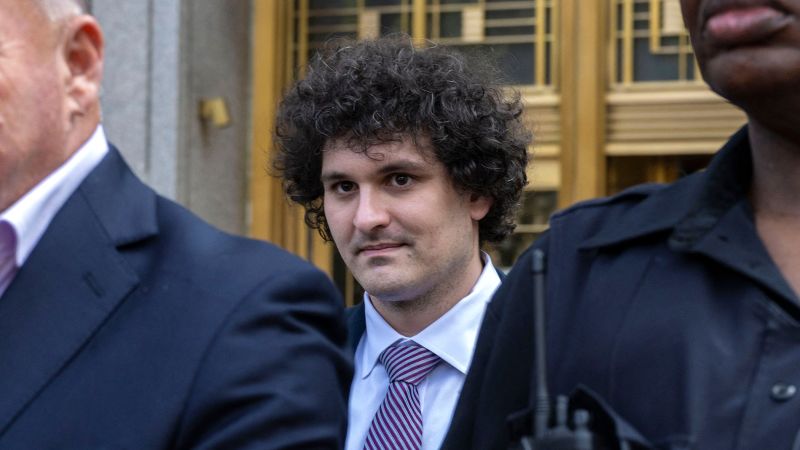Sam Bankman-Fried was found guilty Thursday following a monthlong trial that was almost as wild as the rapid rise and fall of cryptocurrency exchange FTX itself.
He was found guilty of stealing billions of dollars from accounts belonging to customers of FTX. He was also found guilty of defrauding lenders to FTX’s sister company, the hedge fund Alameda Research, which held FTX customer funds in a bank account.
Other charges he was found guilty of include defrauding investors in FTX and a money-laundering charge.
The verdict caps a yearlong saga that took the 31-year-old Bankman-Fried from a billionaire living in a luxury apartment in the Bahamas to a defendant in one of the biggest white-collar crime cases since Bernie Madoff’s Ponzi scheme that fell apart in 2009.
The sentencing hearing date will be in March 2024. He faces up to 110 years in prison.
During the trial, Bankman-Fried took the unusual – and risky – decision to testify in his own defense. Here’s some of the wildest moments.
His hair and shorts … and presidential aspirations
His casual wardrobe and wild, curly hair were subjects of discussion in court.
After Caroline Ellison, SBF’s ex-girlfriend and the former CEO of Alameda Research, testified earlier in the trial that Bankman-Fried’s style was part of a marketing strategy to look like an eccentric startup founder, SBF’s lead attorney Mark Cohen sought to undermine that.
“Why did you wear the shorts and T-shirts?” Cohen asked.
“I found them comfortable,” Bankman-Fried replied.
Cohen also asked about the hair.
“I was kind of busy and lazy and didn’t bother getting a haircut for long periods of time,” Bankman-Fried said.
Overall, SBF said he never intended to be the public face of FTX. It was “an accident” at first, he told the court.
“I hadn’t intended to be a public face of anything,” he said, adding that he is “somewhat introverted.”
Still, Ellison testified that Bankman-Fried told her he believed he had about a 5% chance of becoming president of the United States.
When shopping for an arena with which FTX could launch a brand partnership, Bankman-Fried testified Friday that his company had talks with a few different sports venues.
Eventually, they settled on the home of the Miami Heat, in what was reported to be a $135 million, 19-year deal, renaming the American Airlines Arena as FTX Arena.
Venues that didn’t work out at the time included football stadiums for the New Orleans Saints and the Kansas City Chiefs, as well as the Kansas City Royals’ baseball stadium.
“No offense to the Kansas City Royals, but we didn’t want to be known as the Kansas City Royals of crypto exchanges,” SBF testified.
The FTX Arena was later renamed the Kaseya Center, following the company’s collapse last fall.
Judge Lewis Kaplan expressed exasperation with some of Bankman-Fried’s meandering answers, noting during one point of the trial that the “witness has what I’ll simply call an interesting way of responding to questions.”
When questioned by his own attorneys, Bankman-Fried appeared confident and upbeat. But he grew increasingly agitated when grilled by prosecutors.
SBF sometimes would give vague answers in which he said he was “not entirely sure” or didn’t recall past conversations about company policies and meetings with lawyers.
At one point, Kaplan interjected, urging Bankman-Fried to “listen to the question, and answer the question directly.”
In response to questions from Assistant US Attorney Danielle Sassoon, Bankman-Fried said, variously: “I am giving you my best guess at answering the question. … I am going to answer what I think the question you are asking is, but I apologize if I’m answering the wrong question” and “I wouldn’t phrase it that way. But I think that the answer to the question I understand you to be trying to ask is ‘yes.’”
While Bankman-Fried publicly advocated for crypto regulation, Sassoon suggested that this support was “just for PR.”
“No.” Bankman-Fried replied.
Sassoon then referenced an exchange SBF had with a reporter in which he said “f*ck regulators” and that his advocacy was “just PR.”
Another private conversation showed SBF calling some customers “dumb m*therf**kers.”
SBF pushed back on the question, saying that comment referred only to a “specific subset” of customers.
Perhaps the wildest moment involved “Thai prostitutes.”
Although Bankman-Fried didn’t face bribery charges in his trial, Ellison was allowed to testify at one point about an instance when she believes he ordered Alameda Research, a hedge-fund-like crypto trading house that Bankman-Fried launched in 2017, to wire “in the ballpark of $100 million” to two crypto wallets in China.
She said she believed the funds were a bribe to get Chinese officials to unfreeze two crypto trading accounts worth about $1 billion that Alameda held in in the country.
She described the payments as a last resort after other tactics to move the funds out had failed. One of those failed schemes, she said, involved using accounts belonging to “Thai prostitutes” to set up trades that would drain Alameda’s China accounts and transfer value to the sex workers’ accounts, where Alameda could reclaim them.
Read the full article here




